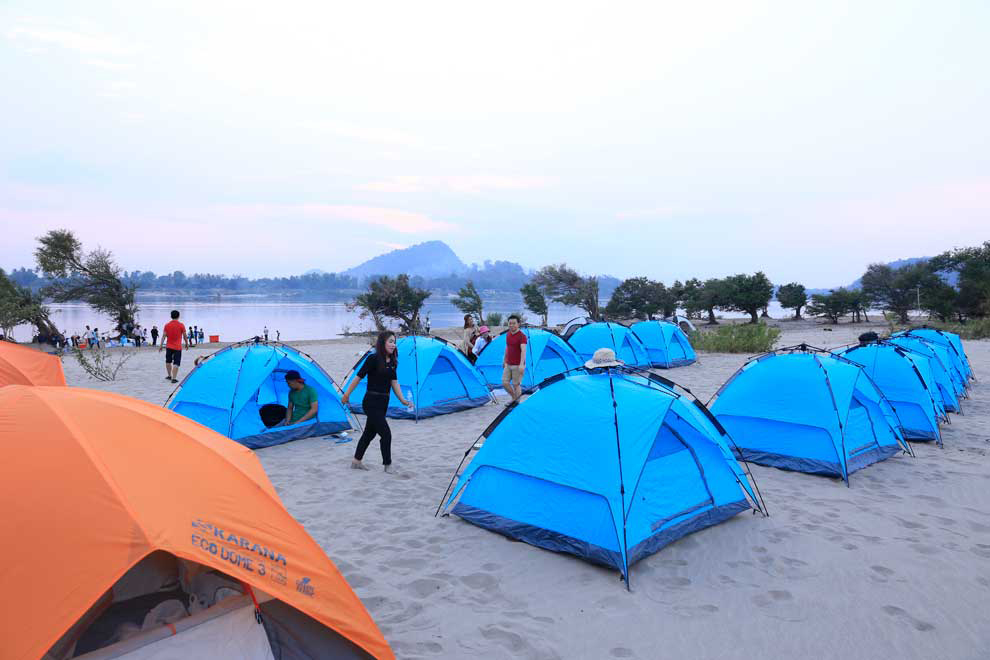
Visitors enjoy paddling boats around the Stung Treng Ramsar site. Post Staff
In a time of geopolitical tensions, cross-border tourism in Southeast Asia remains a testament to the strength of regional cooperation and the commitment of neighbouring countries to bolster their tourism sectors.
Despite recent security concerns between Cambodia and Thailand, tourism officials in both countries remain focused on strengthening the people-to-people connections that have long been a cornerstone of their collaboration.
Dee Suvimol Thanasarakij, executive director of the Mekong Tourism Coordinating Office (MTCO), responded to questions regarding the impact of military confrontations at the Ta Moan Temple on tourism, noting that cooperation continues largely unaffected by broader political tensions.
“The governments do not have any issues when it comes to tourism collaboration,” she said, underscoring that tourism professionals are solely focused on facilitating cross-border travel.
“Tourism is about bringing people together, and that’s what we’re doing—connecting tourists from Thailand to Cambodia and vice versa,” she added.
Thanasarakij addressed a regional workshop in Siem Reap province, hosted by the International Organisation of La Francophonie (OIF), Cambodia, to launch a flagship initiative aimed at promoting sustainable tourism, Destination Eco-Talents, from March 26 to 28.
Indeed, despite political challenges, tourism professionals have remained unwavering in their dedication to fostering strong cross-border relationships.
According to the workshop attendees, tourism professionals remain focused on the mutual benefits that tourism brings to local communities in both countries, providing jobs and creating revenue streams that improve the livelihoods of countless families.

Tourists enjoy camping on the Mekong islands in Stung Treng. Post Staff
Cross-border tourism routes: Strengthening regional ties
A major part of the regional tourism strategy is the creation of innovative travel routes that span multiple countries in the Mekong region.
One of the most notable initiatives is the GMS Tourism Plan 2030, a collaborative effort between Cambodia, Laos, Thailand and Vietnam.
Under the plan, new tourism trails have been developed to promote seamless travel across borders, with a focus on sustainable and community-based tourism.
“Through the Mekong Discovery Trail, travellers can explore the natural beauty and cultural richness of the region, from Cambodia’s Rattanakiri province to the serene landscapes of Laos and Thailand,” said Chuob Ratana, director of tourism development and planning.
“We are working on connecting tourists to local communities through immersive experiences like kayaking, trekking and eco-tourism activities, ensuring that tourism development is both sustainable and beneficial to rural communities,” he added.
The South-Frontism Corridor, which connects Cambodia to neighbouring Vietnam and Thailand, is one such success story.
Already in its advanced stages, the corridor aims to promote cross-border tourism by making travel more accessible.
Thai tourists can now easily visit destinations in Cambodia like Siem Reap and Banteay Meanchey, expanding the range of options available to both domestic and international visitors.
Tourism growth amid global challenges
Despite global uncertainties and regional challenges, Cambodia’s tourism sector continues to thrive.
In 2024, Cambodia welcomed a total of 6.7 million international tourists, a 23 per cent increase from the previous year.
The number of domestic tourists also saw a significant rise, with 22.52 million people travelling within the country — a 20.1% growth from 2023.
Thok Sokhom, undersecretary of state at the Ministry of Tourism, highlighted these positive results in his keynote address at the workshop.
He forecast that Cambodia would see an increase in international arrivals, expecting between 7.2 to 7.5 million international tourists in 2025, assuming regional stability persists.
“The growth we’ve seen in tourism is a direct result of collective efforts from all sectors — both public and private. It’s a testament to the power of regional collaboration,” said Sokhom.
His remarks were part of a broader conversation about structuring a sustainable regional tourism network that encourages cross-border cooperation, with a particular focus on Cambodia, Laos, Thailand and Vietnam.

A Thai bus which travels between Phnom Penh and Bangkok. ANN
Promoting sustainable tourism
A key focus of the GMS Tourism Plan 2030 is the promotion of sustainable tourism, which aims to ensure that the tourism industry grows responsibly while supporting local communities and preserving the environment.
The Mekong Discovery Trail is a prime example of this approach, offering eco-tourism experiences that not only highlight the natural wonders of the region but also emphasize the importance of environmental conservation.
The initiative allows tourists to engage with endangered species like the Mekong River dolphins and enjoy ecotourism activities that are designed to foster respect for the region’s fragile ecosystems.
By offering experiences that promote environmental awareness, the Mekong Discovery Trail sets an example for other regions looking to balance tourism growth with sustainability.
By working together to create innovative travel routes, ensure responsible tourism practices and promote cultural exchanges, the countries of the Mekong region are setting a strong foundation for long-term success.
As the region continues to embrace its diverse cultural heritage and natural beauty, cross-border tourism will remain a vital driver of economic growth, regional cooperation and sustainable development.
The focus remains on making travel easier, more accessible and more meaningful for tourists, while ensuring that local communities and the environment benefit from the growing tourism industry.
“Tourism is not just about travelling to different places; it’s about bringing people together. And that is something we will continue to do, no matter the challenges we face,” said Thanasarakij.
According to the Nation Thailand in January 2025, the Transport Company, an interprovincial bus operator, plans to expand cross-border travel by utilizing 11 bus routes to Laos and Cambodia.
This initiative aims to boost tourism between Thailand and its neighbourings. Currently, the company operates nine bus routes to Laos, including routes from Nong Khai to Vientiane, Udon Thani to Vientiane, UbonRatchathani to Pakse, and others.
In addition, two routes serve Cambodia: one from Bangkok to Siem Reap and another from Bangkok to Phnom Penh.












